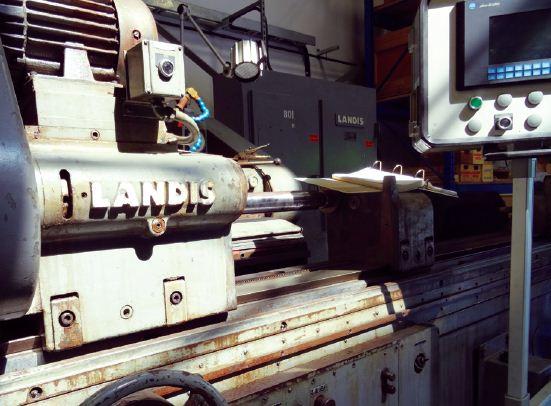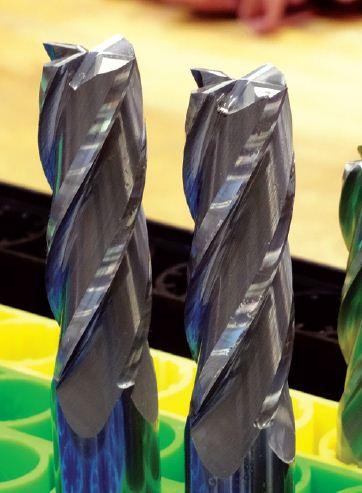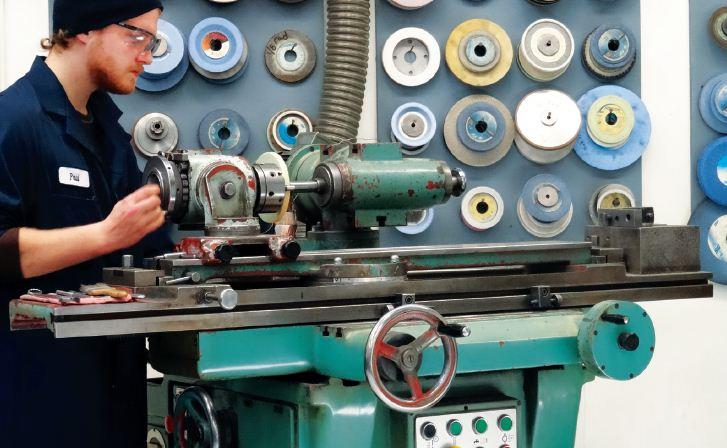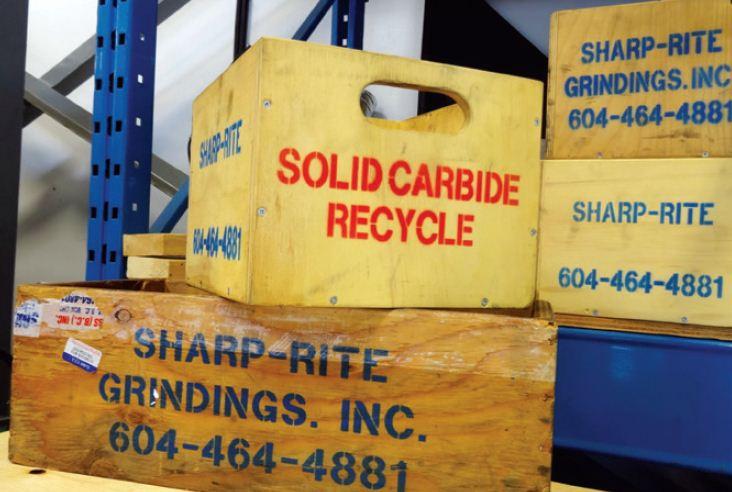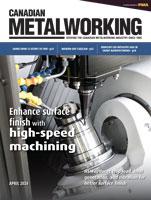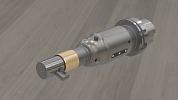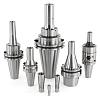- FMA
- The Fabricator
- FABTECH
- Canadian Metalworking
Business Profile: Sharp-Rite
Cutting-edge grinding at Sharp-Rite Tooling and Manufacturing, Port Coquitlam, B.C.
- By Doug Picklyk
- October 26, 2015
- Article
- Cutting Tools
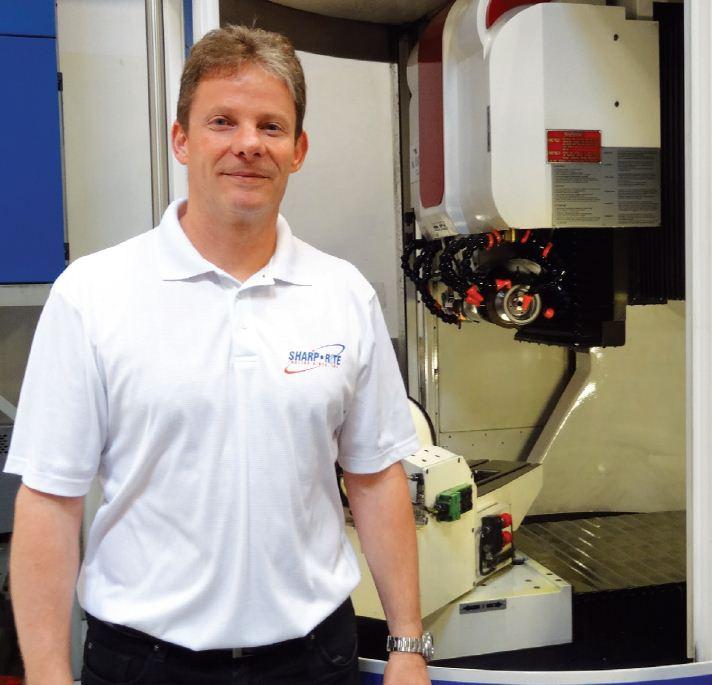
Marke Fox, president of Sharp-Rite Tooling and Manufacturing, with the company’s newer Walter Helitronic Power tool grinding machine.
Beginning as a small tool regrinding operation serving local machine shops in the lower mainland of British Columbia, Sharp-Rite Tooling and Manufacturing has blossomed into a multi-purpose grinding service and tooling provider with its sights set well beyond its B.C. borders.
Marke Fox, president of Sharp-Rite, grew up in the grinding business that was started by his father in 1979. A tool and die maker who learned the trade in Germany, Fox’s father Jonni moved the family from Switzerland to Canada in 1966. Initially settling in Toronto, 10 years later the family headed west to B.C. where the Sharp-Rite business was launched.
“We started off with one tool and cutter grinder and a drill sharpener,” recalls Fox. The antique-looking drill sharpener is still on the shop floor today.
Over the company’s 35-plus years in business it has moved around but it’s always been located in the Coquitlam area, and like the local economy it has experienced its share of ups and downs.
The most recent recession of 2008-09 was especially tough recalls Fox. “We actually got quite worried with what was going on,” he says. “When we got hit, there were days the lights were out completely. We often have an average of 60 to 100 orders in the shop at once, and there was not one job in the shop.”
According to Fox it was a good learning lesson. And once the worst was over, he began to re-evaluate the business and look at the direction the company was going to take.
Today the shop offers a full slate of grinding services with a family of cylindrical grinders, surface grinders and a centerless grinder. A lot of the grinding work is for the energy sector, especially components for down-hole drilling.
The most recent addition to the cylindrical line-up is a rebuilt Landis grinder capable of holding 4,000 lbs. between centers and a length of 122 inches. “These machines are simply workhorses,” says Fox, pointing to the series of older rebuilt grinders in use on the shop floor. “They’re built like tanks, you just can’t find these today.”
The company is continually adjusting to service different market sectors. In the 1990s their shop had three surface grinders dedicated to lumber industry-related materials. As the forestry sector slowed down they had to diversify. “Up until two years ago we only had one small surface grinder in our shop,” says Fox. “Now the forestry industry is coming back, so 15 years later surface grinding is back again.”
And then there is the tool and cutter grinding division, where the addition of a second Walter Helitronic Power CNC tool grinder was added four years ago. Fox recalls the first one his father bought in 1996. “It was state of the art, and we had the Mayor cutting the ribbon at the open house.”
The newer machine includes the addition of an Eco loader, allowing the automated non-stop production of tools from blanks. This investment, along with time and money spent in R&D, has led the company to expand well beyond its regrinding services.
Cutting tool regrinding is a very specialized service, and it can be very cost-effective for machine shops. Fox explains that cutting tools can generally be reground twice, and then those tools are done. And he estimates that a regrind is about one-third the cost of replacing a tool, and for custom tools, the savings can be double.
In the lower mainland there are not a lot of direct competitors for Sharp-Rite, yet there is room to expand, and Fox is exploring the U.S. west coast. Earlier this year the company landed its first U.S. customer, and within six weeks had fulfilled four regrind orders.
“We’ve come a long way since 1979, but I think we’re also just getting started,” says Fox. He recalls having lunch with a colleague about eight years ago and saying, “Hey, wouldn’t it be awesome if we could manufacture our own endmills here in B.C.?” And the friend replied, “It will never happen.”
It took a longer than Fox thought it would, but in the past year Sharp-Rite began selling its own line of regular-length endmills—launching online sales this past spring.
“It was important taking that first step. And customers really like our tooling,” says Fox.
Acknowledging they can’t be experts in every aspect of tooling, Fox has partnered with companies including Sonic Tool in Virginia (old friends of Fox’s father) who collaborated with programming and tool development, local PVD coating specialists Aurora Scientific Corp., and recently Sharp-Rite became the official west coast distributor for New York-based Dura-mill cutting tools to be able to offer a wider breadth of products.
“It’s taken years to build up these relationships, and now everything is in place and we help each other,” says Fox, adding “They give us support, which in turn simply helps our local customers with pricing and delivery.”
Before launching its line of end mills, about three years ago Sharp-Rite started stocking custom tools for customers. For one large local aerospace customer, Fox tells how it took over a year to get one of his tools into their tool crib. “Once we got that tool in it really took off,” he says, noting that what started as regrinding work (an average of about 200 tools a week for that one customer), grew into stocking four or five different tools, and now they’re using Sharp-Rite’s own line.
Fox explains how they did a lot of testing with tool geometries, carbides and coating recipes to get the right combination for their endmills. “Our tools will wear down, but they don’t chip,” he says.
“My biggest goal now is to expand our lines of tooling and supply everybody locally, and have everything available online.”
He knows they are only scratching the surface, and there’s a lot more business to be discovered, perhaps even finding distributors to sell their tooling in the States.
He also wants to further automate their manufacturing processes and likely invest in another CNC tool grinder. “There’s a lot ahead for us. I know we have to take baby steps. That’s what we’ve been doing, and so far it’s worked. The next step is getting some more young enthusiastic workers in here and training, and start building up the business.”
Over its history Sharp-Rite has served as a training facility. Employees have learned the trade and then often left to start their own business.
“Our biggest problem is finding more skilled workers. We have a lot of equipment and it could all be running, but we just don’t have the people to run it,” says Fox.
He explains that they could use additional government support in this area. “Precision grinding equipment is very expensive, and training in our specialized trade is costly, it takes years of supervision and experience. We would love to be a training facility. Have young people come here and we’ll train them.
“We will be a dying trade unless the government starts to initiate some sort of plan to encourage and support small manufacturing companies like us.”
For now, Sharp-Rite is very alive, and its prospects are promising. Together with its sister company Keyway Tooling and Manufacturing that specializes in keyseat cutting tools (run by Fox’s older brother Rob), and its coating partnership, the businesses occupy over 10,000 sq. ft., and Marke Fox is optimistic about the tool manufacturing business. “All of the largest cutting tool manufacturers are not Canadian based, so why not support companies like us, and get us manufacturing here?
“I know we can do it. There’s the challenge of labour costs, but we just have to get more efficient, that’s all.”
One-Stop Recycling Service
As part of Sharp-Rite’s tool grinding services Marke Fox’s father Jonni, the company’s founder, initiated a pick-up/drop-off program for customers back in the 1980s. The company would drop off a “Sharp-Rite” box at clients to be used for picking up their dull tools, and then return the box with the sharpened tools.
About a decade ago Marke Fox turned the boxes into a carbide recycling service, offering to pick up scrap tools (primarily carbide, since high speed steel isn’t worth as much). Customers receive a cheque or a credit on their next regrinding based on the weight.
“We have hundreds of boxes in the mainland, and I would estimate that 80 or 90 per cent of the machine shops around have a Sharp-Rite box in them,” says Fox. The recycling is one more way Sharp-Rite rounds out its complete service for customers. Because they’re already in shops for regrinding or recycling they are very familiar with the tools customers are using everyday.
This allows Sharp-Rite to help out clients in many ways. “We let them know when a tool isn’t in good enough shape to be resharpened, so we’ll ask if they want to replace it,” says Fox, admitting, “We don’t make as much on a new tool, but it’s the resharpening after, and for the customer it’s the convenience.
We’ll supply them with a tool that’s equal to or better than what they already have. “We want to be that one-stop shop for our customers.”
About the Author
subscribe now


Keep up to date with the latest news, events, and technology for all things metal from our pair of monthly magazines written specifically for Canadian manufacturers!
Start Your Free Subscription- Video Showcase
- Industry Events
MME Winnipeg
- April 30, 2024
- Winnipeg, ON Canada
CTMA Economic Uncertainty: Helping You Navigate Windsor Seminar
- April 30, 2024
- Windsor, ON Canada
CTMA Economic Uncertainty: Helping You Navigate Kitchener Seminar
- May 2, 2024
- Kitchener, ON Canada
Automate 2024
- May 6 - 9, 2024
- Chicago, IL
ANCA Open House
- May 7 - 8, 2024
- Wixom, MI













